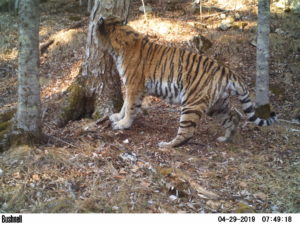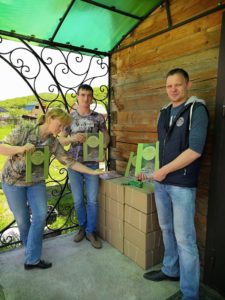Zoological Society of London (ZSL) have been working in the Russian Far East since 2001 and the team’s wide ranging experince has led them to take a holistic approach to tiger conservation in the Lazovsky Zapovednik,(LZ) Zov Tigra National Park (ZT) and adjacent non-protected areas. This approach includes tiger and prey population monitoring, strengthening anti-poaching efforts and wildlife health monitoring.
During the first six months of 2019 the project has carried out the following activites with these key achievements:
- The Annual camera trap survey conducted between Dec 2018 and May 2019 used 121-paired camera traps which were operated over 90 day periods. Forty camera traps were left permanently in LZ and ZT to record supplemental information about resident tigers, including site persistence, body condition and evidence of reproduction (cubs/lactating females).
- 290 sets of images showed a minimum of 21 adult tigers (10 males and 11 females) in the combined areas of LZ, ZT, MHL and SVHL oever 10,890 trap/days. There was also 1 subadult male and five new litters of cubs still travelling with their mothers at the end of this survey. Three litters had 3 cubs, one litter had 2 cubs and one litter had at least one cub.
- The survey also showed that the territory held by male ‘Yasha’ for 11 years has been taken over by a new male, ‘Freddy’. At 14, Yasha was the oldest recorded territorial male Amur tiger and it is likely that he has now died. Additionally the survey has provided an age wide collection of photos which can now be used to construct criteria to help estimate ages of wild Amur tigers from camera trap images, information which is needed for range wide tiger monitoring programmes in Russia.
- Due to the remoteness of this conservation landscape, anti-poaching rangers often lack the technical capacity needed to respond to poaching threats quickly enough. To mitigate this, Rapid Response Teams (RRT) have been established and support of the RRTs has continued in 2019 by providing them with 2 additional GMS poacher cams and 10 regular poacher cams for use where there is limited cell phone service. Three new inspectors were also trained to use ATV and snowmobiles.
- As part of the wildlife health work conducted, this year along with partners Wildlife Vets International, a Russian language book was published entitled ‘Disease Risk Assessment for the Amur Leopard Reintroduction Programme in the Russian Far East’ authored by 12 specialists including ZSL’s.

Amur tiger Yasha. © ZSL

Veterinary book coauthored by ZSL team members. © ZSL

